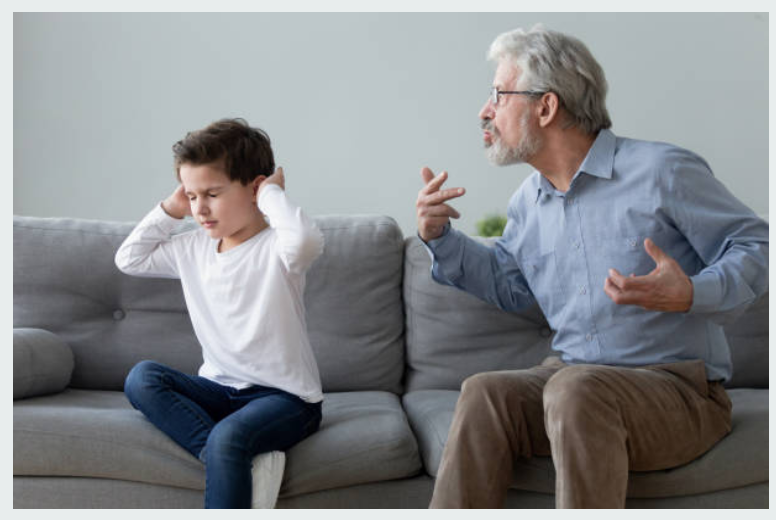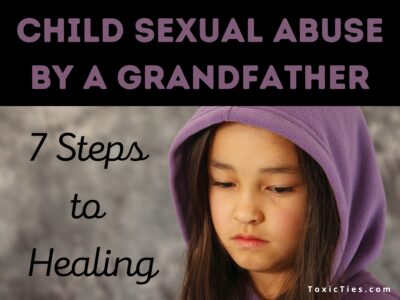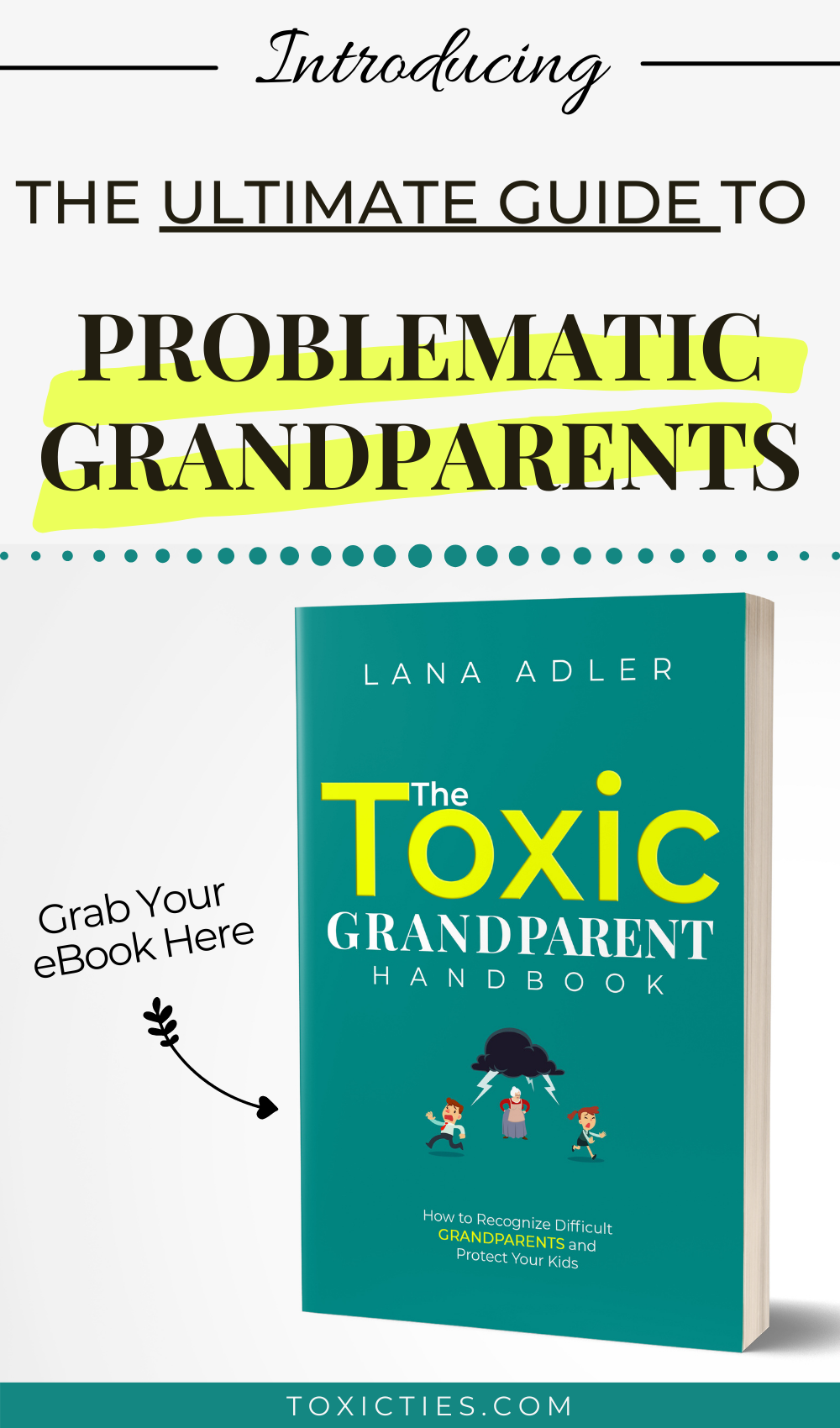Does your child have an angry grandparent? Then they’ve probably incurred their wrath at some point in their lives.
Even if the grandparents are not unleashing on grandchildren, they may be constantly bickering with one another, having unpleasant, nasty fights with other family members, and generally using anger as a habitual response.
This isn’t setting a great example for the grandchildren. Kids are sponges. They constantly observe their environment, even when we think they’re not paying attention.
They also absorb, which is to say that they learn by what they see, not by what they’re told.
So if you’re teaching your child to be respectful and considerate of other people, you won’t get far if she’s constantly exposed to disrespectful and angry behavior in her family.
In this article, we will cover how to talk to a child about an angry grandparent to mitigate the damage.
But first, let’s talk about how anger works, and the signs of an angry grandparent.
How Anger Works
Anger is a natural human emotion. There’s nothing inherently bad or dangerous about anger.
In fact, anger developed as an evolutionary protective mechanism to help us react to danger.
It originates in the amygdala, which is one of the most ancient parts of the brain.
Amygdala is responsible for an automatic response to an environmental threat known as “fight, flight, or freeze.”
So as you can see, anger is not only natural, it’s also necessary for our survival as species.
In fact, vilifying or trying to suppress anger is one of the most harmful things a person can do.
We should all feel free to express anger when it comes up and do so in a safe, healthy way.
The trouble comes when a person expresses anger habitually and does it in an unhealthy way.
Science shows that too much anger has a detrimental effect on the brain and on physical health in general.
People who are quick to anger often suffer from high blood pressure, heart disease, and a weak immune system.
Not only that, with time an angry person has trouble distinguishing between real threats and imagined or insignificant slights.
Anger becomes an automated response to almost any kind of discomfort. So, for example, one careless word can send them into a rage.
They also have a paranoid view of reality, believing that people are trying to hurt or anger them on purpose.
That helps them evade taking responsibility since someone else is always the “cause” of their anger.
10 Signs of an Angry Grandparent
Are you still with me? Now that we know how anger works, we can see that an angry grandparent has a lifetime of letting anger run wild, and their brain is pre-disposed to react with anger to the slightest annoyance.
Of course, every parent or grandparent loses their patience and gets angry with the children at times.
But an angry grandparent is a different story. They are irritable and grumpy all the time. Or they’re quiet for a while and then explode into a sudden violent rage.
So how do you distinguish between normal anger that we all express occasionally and toxic anger unleashed by an abusive grandparent?
1. A hallmark of toxic anger is its sudden and violent nature
An angry grandparent can be normal for the most part, then suddenly lash out with little to no provocation.
Typically, this behavior is ingrained and the person has very little self-control when something or someone sparks their anger.
And it doesn’t have to be your child. They could be mad at someone else, and just take out their frustrations on the grandchild. This is a defense mechanism called “displacement.”
2. The emotional reaction of the grandparent is disproportional to the “offense”
The child may be doing normal child things. For example, they may be cranky, refuse to go to bed, get too loud when playing, or forget to say “please” and “thank you.”
But a grandparent sees these small acts of defiance or childlike forgetfulness as an abnormality and a personal challenge to their authority.
They are quick to yell or punish a child even for the smallest transgressions.
3. Flies off the handle on hair-line triggers
You never know when the grandparent is going to “lose it.”
Their tolerance for being annoyed or inconvenienced is extremely low. Everyone has to walk on eggshells around them.
Children are very sensitive to environmental cues. They may internalize the grandparent’s anger and react with fear and anxiety.
Needless to say, it’s not healthy for anyone in the family.

4. Seems to have no control over their anger
The grandparent’s anger seems to be a wild beast. Once something sets them off, they explode with so much force, no one is safe from it. Even small children.
They may do or say horrible things. They may cross lines and burn bridges. And they may even regret those things when they’ve calmed down.
But while they’re in the thralls of anger, they don’t seem to have the slightest clue how to control themselves.
5. Verbally abusive
An angry grandparent is typically verbally abusive. When they get mad, they express it will yelling, name-calling, cursing, derogatory language, etc.
This is particularly harmful to children. Numerous studies show that verbal abuse is just as damaging as other types of abuse, if not more so.
That’s because it has a tendency to get internalized, becoming the child’s inner voice.
Playful name-calling is OK, like: “You little rascal!”
But if the grandparent regularly calls your children ungrateful brats, crybabies, pests, or other derogatory names, it’s verbal abuse.
6. The anger can quickly escalate from emotional to physical abuse
Some grandparents hit their grandchildren when they’re angry. If that’s the case, most likely they hit their own children, too.
So they consider corporal punishment an acceptable form of discipline. They also encourage you to hit your kids.
Mountains of research show that not only is physical discipline ineffective, but it also causes massive emotional and psychological damage.
Here’s a more detailed post on the subject: Physical Discipline: The Toxic Effects of Hitting a Child

7. Later claims memory loss, or uses other excuses
“Rage blackout” is a controversial theory that says that some people lose consciousness or awareness of what they’re doing when in the thralls of anger, and later have no memory of it.
However, most psychologists agree that these are extremely rare.
In 99% of cases when someone claims they don’t remember what happened during their violent rages, they are using it as a way to avoid accountability.
So if an angry grandparent says they don’t remember what they did or said, or uses some other excuse, what they’re really saying is: I’d like to do whatever I want with no consequences.
8. Never apologizes for their behavior
An angry grandparent feels completely justified in their rage.
No matter how badly they reacted and how much they hurt a grandchild or another family member with their anger, they are convinced that that’s what they deserved.
They have a hard time hearing the “other side” of the story or having empathy for other people’s feelings and needs.
9. Doesn’t have strong interpersonal relationships
An angry grandparent’s world is very unstable.
The slightest disagreement or frustration can send them into a violent rage, straining, or even shattering close personal relationships.
Angry grandparents may be estranged from their siblings, children, or other people who were once important to them.
And even their ongoing relationships are often colored by resentment, embitterment, hostility, hatred, verbal and sometimes physical abuse.
10. Leads a double life
An angry grandparent (or parent) can appear patient, understanding, jovial, and perfectly calm around other people. They may be a respected community member who people look up to.
But in their private life, they see no reason to pretend. It’s only the people closest to them who see their true face, and know how angry they really are.
Like other toxic individuals, they’ve learned to develop a public persona that’s separate and sometimes completely opposite of their private persona.
They reserve their wrath for those closest to them, and those who are most vulnerable.

When angry grandparents go off at grandchildren
My 4-year-old daughter recently experienced her grandfather’s rage.
My father-in-law, a silver-haired and passive man, has always been sweet with my daughter. In fact, he’s never even raised a voice at her, or said “no.”
On that day something (or someone) set him off, and he flew into a blind rage. He burst into a house yelling and cursing. And when my daughter tried to tell grandpa to stop arguing, he barked: Go f**k yourself!
Yeah. I couldn’t believe it either.
From what my husband told me, his father always had an anger issue. Growing up, he was used to his dad flying off a handle when he felt triggered.
But I’ve never seen him act this way towards anyone, let alone his granddaughter.
So this came as a shock. Quite frankly, I’m still grappling with disbelief and my own anger toward the grandfather (and the grandmother who tried to excuse his behavior with “Every family fights”).
However, my first concern was for my daughter.
How does she feel about this? Does she understand what he said to her? Is it something she will remember subconsciously? Most importantly, was any damage done? And if so, how do I rectify it?
So I knew I had to talk to her about what happened.
If you, too, are dealing with a grandparent who allows himself or herself angry outbursts around grandchildren, you can understand my concern.
Whether you decide to address this with the grandparent, or you’re just ready for a nice long break from them, talking to your child and making sure they’re OK is the most important thing in this situation.

How to talk to your kids about an angry grandparent
Sometimes an angry grandparent will lash out at the grandchildren. Other times they’ll lash out at someone when the children are around.
Or they may just be chronically angry — nagging, complaining and bickering with everyone who crosses their path.
Whether you decide to keep an angry grandparent in your children’s life or go no contact, you’ll still have to talk to the kiddos about it.
So here are some pointers for this tricky conversation.
- Help them understand. Tell them that everyone gets angry sometimes. But it’s important that we don’t hurt other people with our anger.
- Help them process the feelings they may have. Children often don’t have the vocabulary to properly label and process their feelings. Plus, they may not tell you how they felt if they think it might get grandpa or grandma in trouble, or cause an issue in the family.
- Reassure them that it wasn’t their fault. Make sure they know they didn’t do anything wrong, and that they’re not responsible for the grandparent’s behavior.
- Don’t badmouth the grandparent. Speaking of the grandparent in a respectful or neutral tone is calming for the child. Children are known to love their grandparents, even difficult ones. So it may be hurtful for a child to hear you speak badly about their grandma or grandpa. Address the behavior, not the person.
- Confirm that it isn’t right to behave this way. It’s important that your child doesn’t learn that this type of behavior is normal or permissible. If possible, have the grandparent apologize to the child.
- Read a book about anger together. Depending on their age, your children might benefit from a learning aid like a book, a video, etc. Or give examples of some better ways to handle anger using references they understand.
- Make sure they’re learning the right communication style from you. Children learn by observing, not by what they’re told. So even if they’re exposed to toxic communication styles from their grandparents, you can still show them the right way to communicate at home. You can do it by treating them with respect, apologizing when you’re wrong, encouraging them to share their feelings, taking a break when things get heated, being respectful of your partner, etc. This way they’ll have two different communication styles to choose from. And it’s not hard to see which one is better. Even a child can tell!
The Angry Grandparent Summary
Phew…That was a lot to digest! Here’s a short summary of everything we’ve talked about in this article.
Having an angry grandparent in the family is upsetting for both the adult children and the grandchildren alike.
It’s also confusing for the grandchild who doesn’t understand what sparked the sudden rage of a grandparent, or why the grandparent is always grumpy or short-tempered with them.
You’ll have to address the issue with the grandparent. But more importantly, you’ll have to talk to your child about it.
When talking to your children, be calm and reassuring. Avoid badmouthing the grandparent.
If the relationship with an angry grandparent has become too hostile, resentful, and bitter, consider taking a break or letting go of the relationship altogether.

NEXT
Toxic Grandparent Checklist: 10 Signs That There Is a Problem









Leave a Reply